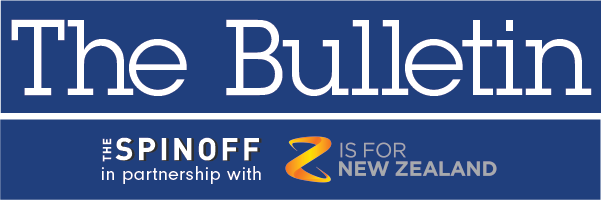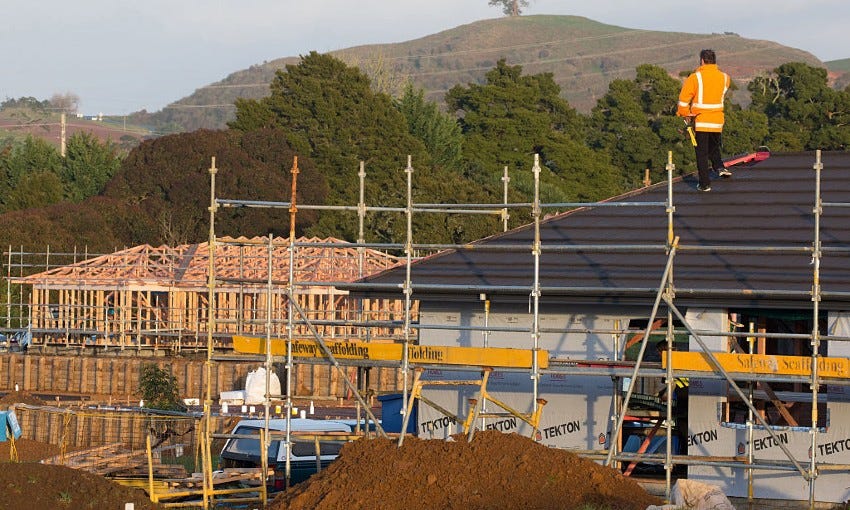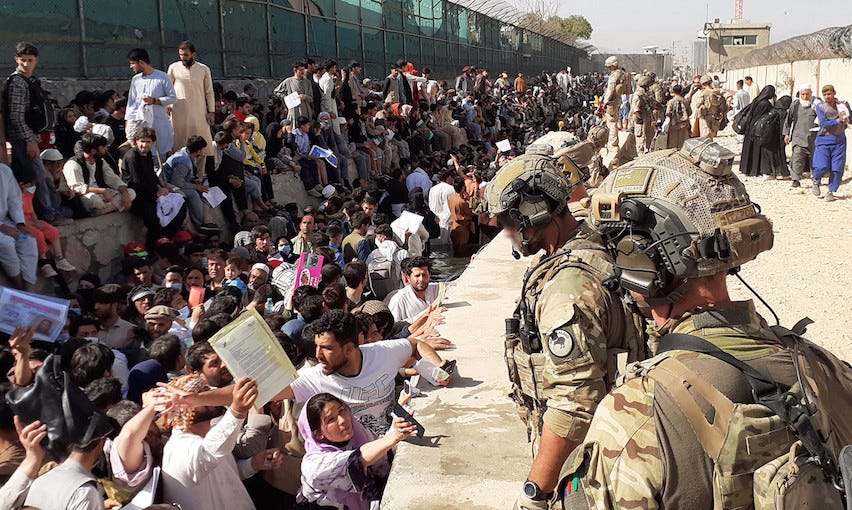Signs of slowing in the housing market
With prices still increasing, experts warn we might be getting to the point where the country is running out of buyers with enough cash.
Good morning and welcome to The Bulletin for Thursday, September 2, by Justin Giovannetti. Presented in partnership with Z Energy
In today’s edition: The country’s housing market faces shortages and rising prices for now, Auckland hospitals need help and Allbirds goes for the stock market.
A house under construction in Pukekohe (Brendon O’Hagan/Bloomberg via Getty Images)
One of the world’s least affordable housing markets might finally be slowing. New Zealand’s house prices are still climbing rapidly, but there’s growing evidence that the soaring increases of the past year and a half might finally be slowing. There are both short and long-term explanations for what isn’t quite a trend yet.
For starters, property prices nationwide rose by 1.6% in August. While that figure from CoreLogic shows a slower increase than in recent months, it would still indicate a double-digit annual increase. There’s no sign of anything resembling a crash. The market would need to slow to about one-tenth August’s rate to match wage growth.
Prices have soared over the past year. August’s rise in prices follows an overall increase of 27% over the past year, leaving the average house in Auckland, Wellington and Tauranga now valued at well over $1 million. Christchurch remains the country’s most affordable large centre at $654,198. As prices continue to rise, the number of buyers has slowly fallen. The bank of mum and dad can only help so much. It’s possible the lack of affordability might be starting to bite, according to CoreLogic’s research:
“As property values rise faster than incomes, the cost of purchasing a home will simply become out of reach for a growing number of would-be buyers, especially as increasing interest rates start to impact the amount of money people can borrow”.
What happens after lockdown? The number of houses on the market has dropped by 52% in recent weeks and prices could surge after restrictions are relaxed, but the research paper says it would be a short-lived bounce. With the reserve bank all but certain to increase the price of borrowing before the end of the year, mortgage costs are set to start increasing.
Some prices have dropped. Prices fell in both Hamilton and Rotorua over the past month, a possible sign that some moves to cool the market could be working. Both cities have been popular destinations for property investors. Changes to tax deductions as well as new lending restrictions could be making a difference, according to Interest. The Real Estate Institute of New Zealand has gone further in a recent report, saying that real estate agents are reporting more first time home buyers at recent sales while investors pull back.
In the longer-term, these prices are unsustainable. That's not my analysis, that's from the reserve bank governor. Two weeks ago, governor Adrian Orr told parliament that prices don't reflect supply and demand anymore. He said that he expects prices to eventually fall as construction gets underway and demand is reduced. That's about as loud a warning as is possible from the reserve bank that mortgages will become more expensive in the coming years. Bloomberg labelled New Zealand earlier this year as “among the world’s least affordable property markets”.
Some of that expected construction could slow in the short term. Auckland’s level four lockdown could have an unexpected effect on the country’s builders, with materials jammed into warehouses around the city, unusable. Most building materials have not been granted an exemption to move beyond Auckland’s borders during lockdown, Stuff reports. With some construction materials like gib board and gutters could run out by the weekend, the industry says it’ll be able to muddle along for another two weeks. If Auckland stays locked down any longer, building sites may need to be shut down.
Costs could increase a lot in the longer term. Complicating matters, the price of those materials has increased in recent months as freight costs have soared. The NZ Herald (paywalled) reports that shipping costs are up almost 100% over the past six months. Many of those costs haven’t been passed on to consumers yet, but they will be in the coming weeks through higher prices. Part of the reason for the increase is a global construction boom as countries exit lockdown.
Councils now face building decisions. To help tackle the housing crisis, the government unveiled a $3.8 billion fund in March to help local councils build the infrastructure needed for new developments. A site in Nelson has applied for some of the money, according to Stuff. The Maitahi Bayview proposal could build up to 350 homes, 100 of which would be deemed affordable, but only if the government money is forthcoming. If local consents are rejected in the coming days, the Ngāti Koata-owned development will instead build about 40 houses.
Higher house costs are leading to higher rents. Students are struggling to find flats for next year, the Otago Daily Times reports. The issue is partly due to fast-rising rents, but also because some landlords are selling to first-time buyers. Families who otherwise would have purchased a home are also renting, while looming healthy home standards mean some apartments need to be left unoccupied as they are brought up to code. There’s a sense of desperation, with some parents calling local real estate agents to help their kids.
The Spinoff is doing our utmost to keep you updated on Covid-19 related news through this outbreak. Every dollar our members contribute directly funds our editorial team and is devoted to ensuring we do more. Click here to learn how you can support the team today.
The Covid numbers: 75 new community cases were reported yesterday, a quarter were active in the community while infectious. One of the new cases was in Wellington and the rest were in Auckland. The number of new cases is a significant increase over the past two days, but the trend is still down. 687 cases have now been detected in the delta outbreak. 84,971 people were vaccinated yesterday.
Yesterday’s live updates from The Spinoff covered the new cases, a battle of words in parliament and an interview on Breakfast TV that went off the rails. Stewart Sowman-Lund has done a skilful job of capturing the bizarre zeitgeist of these times.
Auckland hospitals ask for help. More ICU nurses are needed to cope with the number of Covid-19 cases now in hospital in Auckland, with 32 patients admitted and eight in the ICU. Three of those patients are on ventilators and need specialised round-the-clock care, the NZ Herald reports. The city needs at least 30 nurses for ICU and 30 more nurses to staff managed-isolation facilities. Some non-Covid patients are now being transferred to other parts of the country to free up hospital space.
Changes are coming to the border. A lottery of sorts is being introduced to the managed-isolation booking system to help New Zealanders overseas nab a spot to come home. Instead of using bots and constant refreshing to secure a room, people will enter a digital queue when new spaces are available and some will be chosen at random, Newsroom reports. The change won't come until bookings are reopened. The system is currently frozen to ensure all free rooms are available for the delta outbreak.
The Covid-19 minister has asked residents overseas not to come to New Zealand for a Christmas vacation, but to leave spots for people moving back permanently. A government agency that had hired students to secure spots for staff to come visit on holiday has now admitted to One News that it was a very poor idea.
Restrictions tighten in Australia while premiers drop elimination. The premier of New South Wales now says it’ll be impossible for her state to eliminate delta, as 1116 new cases were reported yesterday. Borders are tightening around NSW, but it’s too late. The Financial Review reported that with cases on the rise, Victoria has abandoned its elimination strategy and will now ease restrictions while seeking to keep case numbers low. Premier Daniel Andrews said he wasn’t aiming for zero cases anymore, but “a sweet spot that is not zero, but it’s not so high”.
Here comes the BIRD. Allbirds is preparing to debut on Wall Street after apply to be listed on the Nasdaq exchange with the ticker symbol of BIRD, according to CNBC. The company has never turned a profit, it revealed in documents and doesn’t expect to make any money “for the foreseeable future.” The wool sneaker brand said it has done well through the pandemic as consumers across North America and Europe have shifted towards a Zoom-friendly wardrobe that is more casual. It’s not odd anymore for a company to enter the stock market while losing money. Uber has lost billions and continues to bleed cash every day.
In conspiracy news, did you know the internet is dead? Following the QAnon conspiracy theory, which is honestly indecipherable, The Atlantic has found the next bonkers conspiracy spreading online: The death of the internet. The theory goes that the entire internet is now fake, largely a creation of artificial intelligence and algorithms, after dying in either late 2016 or early 2017. It’s completely wild, but I can promise you this newsletter is 100% written by a caffeinated human writer.
Got some feedback about The Bulletin, or anything in the news?
Get in touch with me at thebulletin@thespinoff.co.nz
NZDF personnel in Afghanistan following the fall of Kabul in August 20201 (NZDF)
Right now on The Spinoff: Nicky Hager writes that the country needs to learn the lessons from Afghanistan to avoid making them again. Emma Vitz crunches the numbers on how gender and ethnicity impacts paying back student loans. Alex Casey reports on how to avoid mascne, which leaves your skin red and bumpy after wearing a mask. The fun loving Sam Brooks speaks with the head of Rainbow’s End about what happens during lockdown. Zoe Mills warns that the cracks in our mental health system are being highlighted by users on TikTok.
For a feature today, the story that brought down Jeopardy!’s new host. Alex Trebek was a giant of television while I was growing up. Awkward, always ready with a dad joke, and there to leave you smarter. I obviously wasn’t the only person to feel that way. Google has built a joke of sorts into the results if you search his name. For those who have never watched the show, all answers need to be stated as questions.
After a long process, Trebek was replaced by the relatively unknown Mike Richards. He was fired yesterday after a single day as host. This piece of investigative journalism in The Ringer exposed past statements that led to his firing:
Richards’s selection has been met with criticism by Jeopardy! fans and former contestants alike, many of whom have questioned the validity of a prolonged and high-profile audition process that ended with the ascension of someone once tasked with leading it.
And while some disappointment was probably inevitable at the end of a guest host rotation that featured names ranging from LeVar Burton and Aaron Rodgers to Robin Roberts and Savannah Guthrie, the decision to promote Richards—an internal candidate who was relatively unknown to the general public—has sparked more backlash than the show might have anticipated.
Sophie Pascoe’s incredible performance continues.The Paralympian has now won 11 gold medals in her career after clinching another overnight in Tokyo at the 200m individual medley. It's her fourth gold in that event alone, going back to Beijing in 2008. In a sign of how tough the swim was, Stuff reports that she blacked out and needed oxygen after getting out of the pool. She was eventually fine and attended her medal ceremony. She won another gold in the 100m swim on Tuesday.
That's it for The Bulletin. If you want to support the work we do at The Spinoff, please check out our membership programme.







